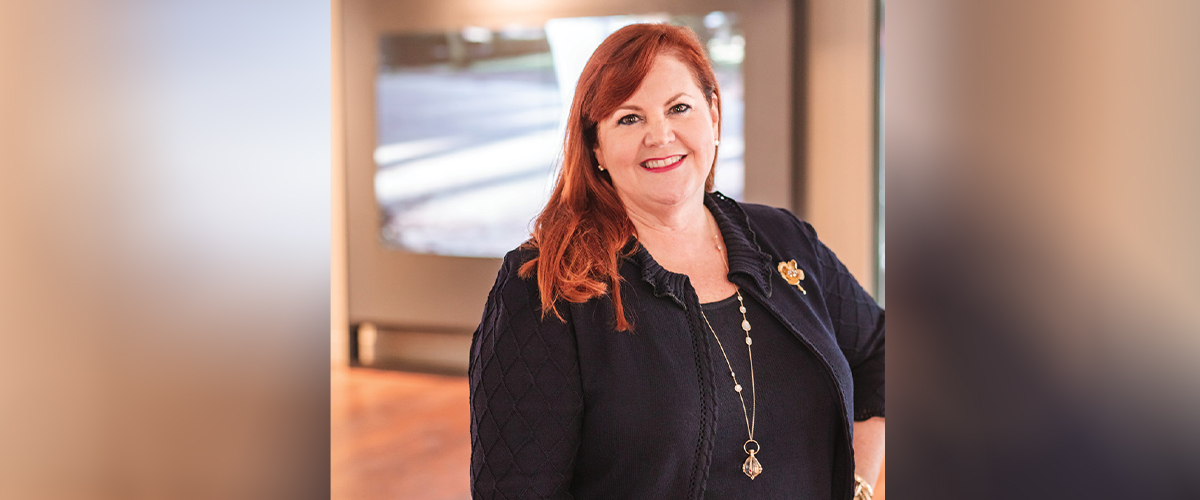WRITTEN BY Stephanie Hunt
PHOTOGRAPH BY Sarah Westmoreland

Though the local tourism industry was gobsmacked by the shutdown, Helen Hill, CEO of Explore Charleston (pictured at the newly renovated Visitor Center), remains confident the sector will bounce back.
A $1 billion loss: that’s the estimated skid mark left after Charleston’s hospitality and tourism industry came to a screeching halt last spring, and a figure that only represents losses from mid-March 2020 through mid-May, according to the most recent report from College of Charleston’s Office of Tourism Analysis.
Before COVID-19, the greater Charleston region welcomed seven million visitors a year, but after airports and hotels closed, when cruise ships, restaurants, house tours, and beaches were suddenly off-limits, the engine that generates an $8 billion regional economic impact suddenly went kaput. Hotel occupancy plummeted from 74 percent in 2019 to 45 percent in 2020, and because most tourism spending is generated by overnight visitors, according to Perrin Lawson, deputy director of Explore Charleston, that decrease ultimately impacts every other business that depends to some degree on visitor spending, including the City of Charleston’s budget.
As Explore Charleston’s CEO, Helen Hill is the Holy City’s chief cheerleader and master saleswoman, for whom the glass is always more than half full, even if that glass seems to have shattered on the floor. When it was evident the 2020 spring season would be a bust, she rallied her team with assurances “that we’ll have the best summer we’ve ever had,” and now is in full “figure-it-out-as-we-go-along” mode. “We’re expanding everything we’ve been doing to fill holes that weren’t there before,” she says, promoting micro weddings, for example, and messaging that Charleston’s island destinations are beautiful year-round, not just in summer. “The whole world is trying to get visitors back,” she adds, and thus the pandemic has meant honing in on what “really differentiates Charleston.” One such factor: the fact that many of the city’s hotels and landmark properties are independently owned.
“We’ve always known we were fortunate to have local owners in our hospitality sector, but we’ve really felt the truth in the saying that ‘small business is the community backbone,’” says Hill, who points to people like Dean Andrews of Easton Porter Group, who made sure Zero George reopened as soon as possible. “It speaks to their stick-to-itiveness. They’re limping along at 30 percent occupancy, but making it work. They truly care about excellent service and holding on to their team.” If one owner has a high-powered disinfecting machine, they lend it to their neighboring hotel, she adds. “This experience is binding us together, and making us all stronger.”
“We really do believe in amazing hospitality and friendliness….COVID hasn’t taken it away; it just made it look different.” —Helen Hill, Explore Charleston
The pandemic has also pointed out the vulnerability of a community that is so heavily tourism dependent, which Hill acknowledges. And last summer’s social justice protests have further heightened Explore Charleston’s resolve to tell the African American story in a more intentional way. “African American history and contributions are so knit into the fabric here, so how do we better call that out?” she asks. Explore Charleston has also strengthened alliances with other sectors, including health care, as a result of partnering with MUSC to launch a public health PR campaign and offer COVID testing at the airport.
For Hill, the past year’s biggest takeaway has been the reassurance “that Charleston really is who we’ve been telling the world we are. I’ve always worried if we’ve oversold on our hospitality claims,” she admits. “But no. We really do believe in amazing hospitality and friendliness. You see it as waiters, bellhops, and housekeepers smile beneath their masks—it’s real. COVID hasn’t taken it away; it just made it look different. All our hyperbole about excellent service is true, there’s something to it,” she affirms. “When travel comes back—and it will—we’ll be ready.”
>>Back to The Long Strange Year article